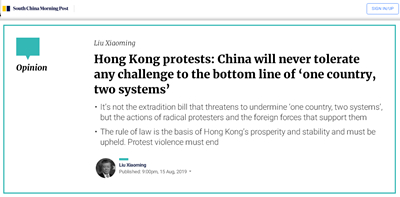|

On 15 August 2019, South China Morning Post carried an article by Ambassador Liu Xiaoming entitled China will never tolerate any challenge to the bottom line of “one country, two systems”. The full text is as follows:
Hong Kong, and the violence in the city, has been a focus of public attention and the extradition bill is blamed. What is it about this bill?
Early this year, the government of the Hong Kong Special Administrative Region (SAR) proposed to amend the Fugitive Offenders Ordinance and the Mutual Legal Assistance in Criminal Matters Ordinance to strengthen the rule of law and plug a legal loophole caused by a lack of extradition arrangements between Hong Kong and many other places, including but not limited to the Chinese mainland.
However, this legitimate act aimed at preventing Hong Kong from becoming a haven for fugitives was distorted by the opposition and some foreign forces, who claimed this would allow the SAR to send people to the Chinese mainland for trial.
Due to a lack of consensus, the SAR government decided to put the work on hold.
Critics say the bill will undermine “one country, two systems”. My first question is: who is attempting to undermine it?
The principles of “one country, two systems”, “Hong Kong people governing Hong Kong” and “a high degree of autonomy” for Hong Kong have been fully implemented and ensured prosperity and stability in Hong Kong for the 22 years since the handover. This is recognised the world over. The initiation of the extradition law amendment and the decision to halt the legislative process in response to public opinion are both reflections of these three principles.
However, a few radicals have responded with premeditated violence. They stormed the Legislative Council complex, besieged the representative office of the central government, tore up copies of Hong Kong’s mini-constitution, known as the Basic Law, defaced the national emblem and the national flag, blocked roads, paralysed traffic and attacked police officers with improvised weapons.
Such actions were not a peaceful demonstration but open defiance of the rule of law and social order. They threaten the safety of life and property and challenge the bottom line of “one country, two systems”.
Behind these acts are traces of foreign instigators who spread rumours and create panic in society. These instigators, including certain Western politicians and media, applaud radical behaviour and call for sympathy and tolerance for the radicals. They blame the unrest on Hong Kong police who were simply performing their duty to safeguard the rule of law.
Some Hong Kong media reported that a US consular official based in Hong Kong met several key advocates of Hong Kong independence. What could this act mean except to make a mess of Hong Kong and use it to contain China? So, who is ruining Hong Kong and undermining “one country, two systems”?
My second question is: how should we accurately understand “one country, two systems”? The years since the handover have proved that “one country, two systems” is the best solution for Hong Kong, an excellent arrangement for the city’s long-term prosperity and stability.
“One country, two systems” must be seen as one inseparable concept. Some people in the West over-emphasise “two systems” and forget that “one country” is the basis and precondition for the viability of “two systems”.
For this formula to work in Hong Kong, there are three bottom lines – namely, no tolerance for any activity that, one, undermines national sovereignty and security; two, challenges the authority of the central government or the Basic Law; and, three, uses Hong Kong for infiltration or sabotage against the Chinese mainland.
The central government will stay true to “one country, two systems” and make sure that it is fully applied in Hong Kong without distortion. The allegation that this principle is being undermined reflects either a lack of accurate understanding of this policy, or betrays intentional misinterpretation driven by a political agenda.
Now let me turn to the third question: what does Hong Kong need most now?
Since its return to the motherland, Hong Kong has continued to be a centre for international financial services, trade and shipping. It has been the world’s freest economy for more than 20 years, notable for its adherence to the rule of law, and its people enjoy democratic rights and freedoms rarely seen in other parts of the world. Such achievements are accredited to the success of “one country, two systems”, and to the city’s commitment to the rule of law and its focus on economic growth.
The rule of law is a core value that the Hong Kong people take pride in. It is the foundation for Hong Kong’s sound business environment and a cornerstone of its prosperity and stability. Under the rule of law, all laws must be observed and all offenders held to account.
Violence and lawlessness cannot be tolerated. Conniving in violence is tantamount to damaging the cornerstone of Hong Kong’s prosperity and stability. No government in the world, not even those in the West, would sit back and watch while illegal demonstrations rage on.
Hong Kong’s prosperity and continuous development have given the city a solid foundation. But, sound as it is, the economy of Hong Kong cannot afford continuing chaos, which will take a toll on many aspects of life in this city, including foreign investments.
What Hong Kong needs most now is to restore social order, uphold the rule of law, bring violent offenders to justice and say “no” to foreign interference.
It is in the interests of both China and the international community to have a prosperous and stable Hong Kong, where over 300,000 British citizens live and work, and where 300 British companies are doing business.
I sincerely hope that the people from all walks of life in the UK will act in the interest of Hong Kong’s prosperity and stability, and refrain from saying or doing anything that may undermine the rule of law in Hong Kong.
|

